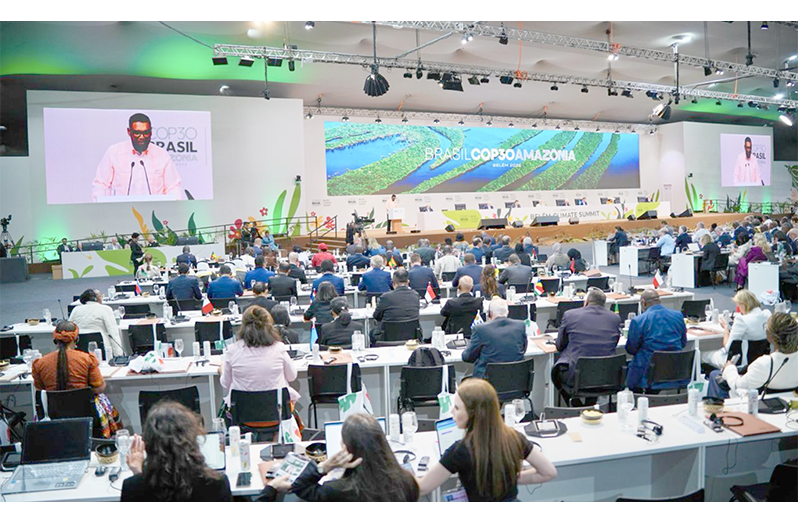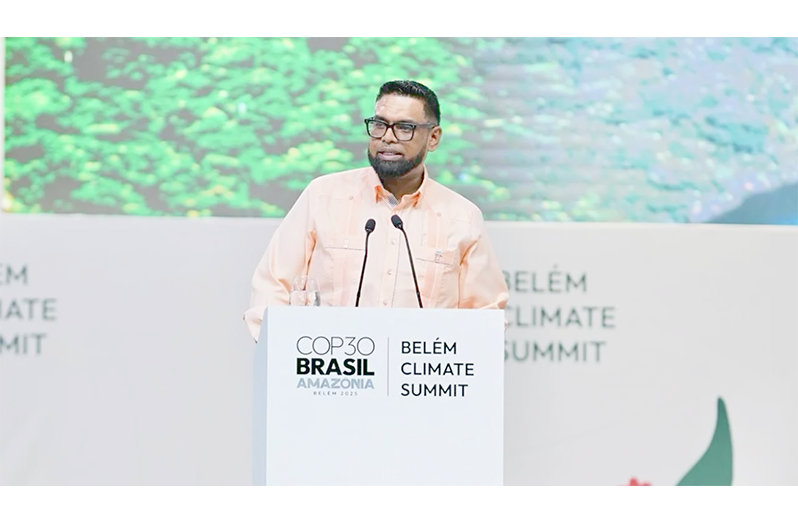–President Ali tells world leaders at COP30
–calls for accelerated energy transition, more climate financing, action on forest conservation
IN a passionate appeal for accelerated efforts towards energy transition, advancing climate adaptation financing and decisive action on forest conservation, President Dr. Irfaan Ali on Thursday urged world leaders to shun extremism and foster greater collaboration to combat the gruelling implications of the climate crisis.
Addressing the 30th United Nations Climate Change Conference (COP30) in Belém, Brazil on Thursday, the Guyanese Head of State pointed out that the developing world remains at the forefront of the fight against the climate crisis.
“Climate change is still happening, bringing pain and loss. Just last week, Hurricane Melissa devasted Jamaica, Cuba, Haiti and the Bahamas. They need our solidarity now,” he said.

Hurricane Melissa was an extremely powerful, erratic, and catastrophic tropical cyclone which became the third-most intense Atlantic hurricane on record. It made landfall in Jamaica and was the strongest hurricane to make landfall on the island, surpassing Hurricane Gilbert.
Dr. Ali noted that while many have questioned the outcomes of previously held COPs, leaders today have the opportunity to act decisively, fixing the mechanism that has already been established to respond and bring about active solutions.
“Here in Belém, we need that to change. Our challenge is not to dismiss COPs but to fix the machinery of co-operation, so that good ideas can move forward,” he emphasised.
ENERGY TRANSITION
President Ali reminded his audience that the global energy demand is rising, and this is now coupled with the demand for artificial intelligence and data systems. However, chronic energy and security continue to define the lives of billions, he said.
This he believes makes one truth unavoidable; digital revolution, artificial intelligence and automation are reshaping economies.
“We must accelerate the energy transition at the same time as we expand energy security. That means moving on two tracks, massive investment to scale renewables, hydrogen storage and modern grid systems, the decarbonised growth and meeting rising demand and science-based policy that advances a just transition by powering the remainder of the fossil fuel era with the lowest carbon, most efficient, least cost fuels,” he said.
He noted that the world can no longer rely on global slogans, the carbon price, the removal of fossil fuel subsidies and competition that is based on carbon science.
“It also means recognising that responsible producers must be included in the source for solutions,” Dr. Ali added.
ACT ON FOREST
Shifting his attention to conservation efforts, President Ali made a case for the forest to be the mainstream topic on the agenda for COP30.
“They have served around 1/3 of global emissions and remain the most viable and cost-effective opportunity for mitigation by 2030. The forest cannot be an afterthought,” he said.
He noted that conservation of forest can no longer be a negotiated item on the agenda.
“We must not fight for forest to be on any agenda. If we are serious about climate change, forest must find a permanent place on the agenda of climate change.”
Guyana has made significant strides in forest conservation, with its Low Carbon Development Strategy (LCDS) 2030 serving as a central policy framework for sustainable development and climate action.
The LCDS 2030 builds on the earlier LCDS 2009, outlining a strategy for Guyana to develop in a low-carbon, non-polluting manner, while leveraging its natural resources sustainably.
ADAPTATION FINANCE
The president further called on key players to expand financing for climate adaptation, helping countries, especially those most vulnerable to climate change mitigate the effects.
The Guyanese leader noted that these priority pillars are not just slogans, but crucial areas that require immediate action to save lives.
“Even if all mitigation targets are met, millions already live with the consequences of climate change. For them adaptation is survival. Investing in resilience protects lives, food systems and economies. It strengthens stability and peace,” he underscored.
Global leaders he said must now grasp at the opportunities that are available to move climate goals from promises to progress.
“People everywhere, and in particular, the people of the developing world, are offering practical experience-based solutions if we commit ourselves to shun extremism and instead promote collaboration,” Dr. Ali said.



.jpg)








